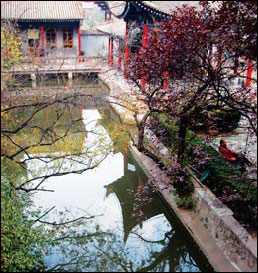Chinese Way
More than being clean
Updated: 2011-03-14 07:58
By Liu Xiangrui (China Daily)
The first record - on oracle bones - of Chinese bath habits dates back more than 3,000 years, and there is evidence that people used special utensils for bathing during the Spring and Autumn Period (770-476 BC).
The first treatise on bathing was written by an emperor about 1,500 years ago.
In the old times, bathing was taken seriously and was a highly ritualistic affair.
A bath served two main purposes: One was to cleanse the body, and the other to "cleanse the soul" and show reverence.
Emperors as well as Buddhist and Taoist priests were required to bathe before offering sacrifices or doing religious rites. The bathing ritual followed strict procedures and even included instructions on the correct way to undress.
|
The Palace of Huaqing in today's Xi'an was well known for its spas. Qing Hua / CFP |
The ablutions, supervised by full-time officials, were a critical part of the imperial sacrifices during the Western Zhou Dynasty (11th century-771 BC). The feudal lords had to bathe before presenting themselves before their king.
Bathing was a core part of social etiquette. Husband and wife were not allowed to share the same bathroom and, as a mark of respect to the elderly, youngsters were required to boil water for their parents to wash their body every five days, and their hair every three days. The same applied to guests who, in turn, were expected to take a bath before sitting down to a meal.
Later periods saw new customs emerge around bathing. For example, people in the Han Dynasty (202 BC-AD 220) would bathe by the riverside in late spring to "clear" bad luck and disease. Even emperors would do so.
Han Dynasty officials were allowed to take a day's leave for bathing at home every five days, and bathing became the reason for a bank holiday for the first time. In the Tang Dynasty (AD 618-907) the arrangement was changed to one day off in 10 days.
For the royal families, bathing was a time to indulge in some fun. China's first emperor Qin Shihuang built such grand bathing facilities for his concubines that the grease of cosmetics, according to the descriptions of poet Du Mu, covered the surface of the two rivers beside the palace.
Favored by the royal family, especially Emperor Xuanzong, hot spring baths became a fashion in the Tang Dynasty. Xuanzong would spend a whole winter with Lady Yang, his beloved concubine, in the Palace of Huaqing in today's Xi'an, Shaanxi province, once known for its stately spas.
These spas developed further in later periods, with the rooms for officials separated from those for ordinary citizens.
Bathing was especially popular during the Song Dynasty (AD 960-1271), when public baths and helpers for rubdowns appeared in the cities.
Notes of scholars and bureaucrats show that many of them visited public baths regularly, often in company, and with rubdown helpers in tow. The tradition of rubdowns remains to this day.
"Hun tang", literally a bathhouse for people from every walk of life, thrived in the cities during the Ming (1368-1644) and Qing dynasties (1644-1911).
While traditional public baths still exist, more people are turning to modern bathhouses with new functions and services. New China saw the emergence of saunas at the beginning of the 1980s, though they were included as part of the general bathhouses later.
Meanwhile, bathing is getting more luxurious and expensive, with the appearance of tea baths, milk baths, salt baths and flower baths; Korean, Japanese and Thai-style ones; and exotic oil-massage baths.
E-paper

Factory fever
Despite auto manufacturing bubble scare, car giants gear up expansion of factories.
Dressed for success
Fabric of change
High spirits
Specials

Earthquake Hits Japan
A massive 8.8 magnitude quake hit the northeast coast of Japan on March 11,2011.

NPC & CPPCC sessions
Lawmakers and political advisers gather in Beijing to discuss major issues.

Panda campaign
Black-and-white bear helps Chengdu in marketing campaign after quake.

